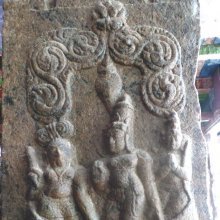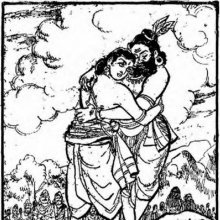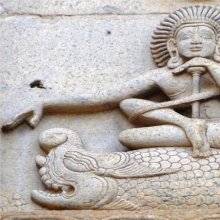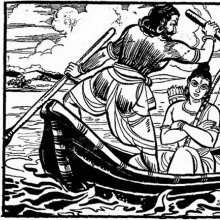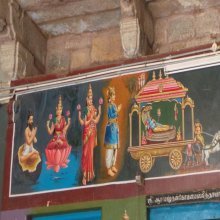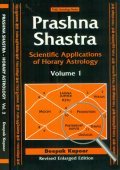Boat: 1 definition
Introduction:
Boat means something in the history of ancient India. If you want to know the exact meaning, history, etymology or English translation of this term then check out the descriptions on this page. Add your comment or reference to a book if you want to contribute to this summary article.
Images (photo gallery)
(+2 more images available)
India history and geography
Source: Singhi Jain Series: Ratnaprabha-suri’s Kuvalayamala-katha (history)Boats or Ships were commonly employed for Sea-voyages in ancient India (known in Prakrit as: jattā, or Sanskrit: yātrā), and was vividly depicted in the Kathās (narrative poems) such as Uddyotanasūri in his 8th-century Kuvalayamālā (a Prakrit Campū, similar to Kāvya poetry).—Details of preparation for sea-voyage are given which include the following items relating to preparatory ritual and the equipment of the ship: [e.g., arrangement of boats or ships;] [...]. When the boat was to take off auspicious musical instruments were sounded, conch-shells were blown, auspicious songs were sung, Brahmins muttered the āsīsā; and thus in the sound of invocation and jaya jaya the boat took off its voyage, the sails were unfurled, the ropes and riggings were pulled up, the oars began to be operated, the helmsman took observations, the boat fell into its course, favourable winds began to blow: thus the boat started its journey being tossed on the high sea waves.

The history of India traces the identification of countries, villages, towns and other regions of India, as well as mythology, zoology, royal dynasties, rulers, tribes, local festivities and traditions and regional languages. Ancient India enjoyed religious freedom and encourages the path of Dharma, a concept common to Buddhism, Hinduism, and Jainism.
See also (Relevant definitions)
Starts with: Boat durian, Boat lily.
Ends with: Man in a boat, Men in a boat, Three men in a boat.
Full-text (+830): Nau, Mangini, Vahitra, Tarani, Yanapatra, Tari, Navya, Nauyayin, Vavuta, Navika, Arnavapota, Nauka, Potaraksha, Padaraka, Manga, Vahana, Naukrama, Tarika, Atinau, Agabota.
Relevant text
Search found 218 books and stories containing Boat; (plurals include: Boats). You can also click to the full overview containing English textual excerpts. Below are direct links for the most relevant articles:
The Great Chronicle of Buddhas (by Ven. Mingun Sayadaw)
Part 3 - Visukamma Deva created an Auspicious Royal Lake for the Prince < [Chapter 2 - The Performance of the Ploughing Ceremony]
Part 4 - Discourse on the Life of the Bodhisatta Brahmin Sankha < [Chapter 22 - Founding of Vesali]
Part 2 - King Pasenadī Kosala’s Alms-giving (asadisa-dāna) < [Chapter 35 - Story of Māra]
The Boat < [January - March 1977]
The Understanding Mind < [March 1937]
Childhood < [July – September, 1990]
Lalitopakhyana (Lalita Mahatmya) (by G.V. Tagare)
Heimskringla (by Snorri Sturlson)
Part 6 - The Murder Of Beintein < [Chapter XIV - Saga Of Sigurd, Inge, And Eystein, The Sons Of Harald]
Part 6 - Battle In The Island Forminterra < [Chapter XII - Saga Of Sigurd The Crusader And His Brothers Eystein And Olaf]
Part 25 - Letters Of The Throndhjem People < [Chapter XVI - Magnus Erlingson's Saga]
Apadana commentary (Atthakatha) (by U Lu Pe Win)
Commentary on the Biography of the thera Khadiravaniya < [Chapter 1 - Buddhavagga (Buddha section)]
Discourse on Sumedha, the Future Gotama Buddha < [Part 1 - Remote preface (dūre-nidāna)]
Commentary on the Biography of the Thera Mahākassapa < [Chapter 1 - Buddhavagga (Buddha section)]
Manusmriti with the Commentary of Medhatithi (by Ganganatha Jha)
Verse 8.409 < [Section XLVIII - Laws relating to Civic Misdemeanours]
Verse 2.204 < [Section XXX - Rules to be observed by the Religious Student]
Verse 7.45 < [Section IV - Duties of the King]
Related products
